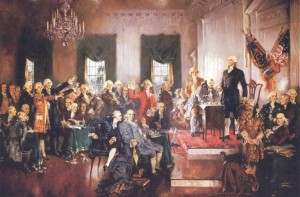I was doing research for a cool, meaty, indepth July 4th post. I was looking to do something informative and symbolic. Then it hit me. The revolutionary war created blogging. 
It took 225 years, but if it weren’t for the rag tag crew of soldiers called Minutemen, I don’t think I’d pounding on this keyboard right now.
Blogging is one of the greatest accomplishments of America and our embrace of free speech. Blogging is about expression, whether you’re a Mommy blogger, a political wonk, (left or right wing), an artist, or an angry, disgruntled, disenfranchised person, blogs give you a voice and America allows you to exercise that voice in allowing you to say what ever it is you want.
We can easily forget what makes blogging special is not the technology, or WordPress, or Typepad, and it’s not the Mac or PC you type on. It’s what each one of us says on them. It’s the stories, the expression, the ideas that flow from our heads that make blogs what they are and it’s the ideology of America which provides the permission. Without a safe culture, safe from persecution, blogging doesn’t exist. True blogging can only exist where we are free to speak our minds.
Our forefathers could NEVER have foreseen what we are capable of today. But, they didn’t have to. They understood only a handful of rights, inalienable rights, were required and would persevere regardless of what the world looked like. So far, I have to say they were right. Well done boys, well done!
Happy 4th of July
Bill of Rights
Amendment I
Congress shall make no law respecting an establishment of religion, or prohibiting the free exercise thereof; or abridging the freedom of speech, or of the press; or the right of the people peaceably to assemble, and to petition the government for a redress of grievances.
Amendment II
A well regulated militia, being necessary to the security of a free state, the right of the people to keep and bear arms, shall not be infringed.
Amendment III
No soldier shall, in time of peace be quartered in any house, without the consent of the owner, nor in time of war, but in a manner to be prescribed by law.
Amendment IV
The right of the people to be secure in their persons, houses, papers, and effects, against unreasonable searches and seizures, shall not be violated, and no warrants shall issue, but upon probable cause, supported by oath or affirmation, and particularly describing the place to be searched, and the persons or things to be seized.
Amendment V
No person shall be held to answer for a capital, or otherwise infamous crime, unless on a presentment or indictment of a grand jury, except in cases arising in the land or naval forces, or in the militia, when in actual service in time of war or public danger; nor shall any person be subject for the same offense to be twice put in jeopardy of life or limb; nor shall be compelled in any criminal case to be a witness against himself, nor be deprived of life, liberty, or property, without due process of law; nor shall private property be taken for public use, without just compensation.
Amendment VI
In all criminal prosecutions, the accused shall enjoy the right to a speedy and public trial, by an impartial jury of the state and district wherein the crime shall have been committed, which district shall have been previously ascertained by law, and to be informed of the nature and cause of the accusation; to be confronted with the witnesses against him; to have compulsory process for obtaining witnesses in his favor, and to have the assistance of counsel for his defense.
Amendment VII
In suits at common law, where the value in controversy shall exceed twenty dollars, the right of trial by jury shall be preserved, and no fact tried by a jury, shall be otherwise reexamined in any court of the United States, than according to the rules of the common law.
Amendment VIII
Excessive bail shall not be required, nor excessive fines imposed, nor cruel and unusual punishments inflicted.
Amendment IX
The enumeration in the Constitution, of certain rights, shall not be construed to deny or disparage others retained by the people.
Amendment X
The powers not delegated to the United States by the Constitution, nor prohibited by it to the states, are reserved to the states respectively, or to the people.


